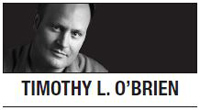[Timothy L. O’Brien] Trump and politics of disruption
By Korea HeraldPublished : Oct. 1, 2018 - 16:46
 When US President Donald Trump gave his first press conference in 19 months on Wednesday, he was asked about the laughter that greeted him at the United Nations after he claimed that “in the history of our country” his administration had proven to be unusually successful.
When US President Donald Trump gave his first press conference in 19 months on Wednesday, he was asked about the laughter that greeted him at the United Nations after he claimed that “in the history of our country” his administration had proven to be unusually successful.“They weren’t laughing at me. They were laughing with me. We had fun. That was not laughing at me,” Trump replied. “So the fake news said people laughed at President Trump. They didn’t laugh at me. People had a good time with me. We were doing it together. We had a good time.”
As the UN fiesta demonstrated -- alongside the jolly cage match otherwise known as the Kavanaugh-Ford Senate hearing, Deputy Attorney General Rod Rosenstein’s jovial visit to the White House to find out if he still had a job and Federal Reserve Chairman Jerome Powell’s mirthful explanations for why he needed to ignore Trump’s public lobbying against interest rate hikes -- lots of people and institutions have, indeed, had a really fine time with the president last week.
Let us put all the fun aside for a moment, though. Instead, let’s think about the thread tying all these episodes together: An assault on the independence and reputations of the institutions that protect civil society or help keep domestic and international affairs humming along.
The Supreme Court is, by constitutional design, meant to have some distance from the political fray. In practice, it is often shot through with bias and insularity and is regularly buffeted by other branches of government as they try to influence it. Still, it’s all we have. It offers the possibility of final judgments and it sits atop a court network that compares pretty well to other countries. And it should live beyond the president’s narrow partisanship, even when seating a new justice becomes a smackdown.
In Brett Kavanaugh, we have perhaps the most openly political nominee in the modern court’s history. Under pressure Thursday and stressed to the point of tears, he lashed out at a murky network of lefties determined to ruin his nomination in alliance with the Clintons. Will he ever be seen again as a jurist who can put politics aside to serve the country on the court?
The court is hardly the only institution in play. The president has been assailing the Justice Department for months, labeling Special Counsel Robert Mueller’s probe of Russian interference in the 2016 presidential campaign a “witch hunt.” He has routinely sideswiped Attorney General Jeff Sessions as weak-willed and inadequate, and openly wondered why Sessions has bothered pursuing loyal Republicans who may have broken the law.
In a nation of laws, the Justice Department should be just as free of presidential meddling as the Supreme Court, but in Trump’s world that’s simply not the case. When Rosenstein bolted over to the White House on Monday to either tender his resignation or be fired after a damaging report about his own conduct in the New York Times, Trump’s sway over the Justice Department seemed fully realized. According to a separate Times report, Rosenstein wanted to make sure he could leave on “amicable terms” with Trump and avoid being subjected to a Twitter attack. Stockholm syndrome.
It doesn’t end there. On Wednesday, shortly after the Fed announced a quarter-percentage point rate hike, Trump let it be known that he was “a low-interest-rate person” and didn’t like Powell’s move. Like the Supreme Court and the Justice Department, the Fed is designed to be independent of the White House so its stewards can monitor the economy dispassionately. The Fed, like other institutions, is not flawless and it should be open to reform. But presidents are not meant to muck about in its affairs. Powell at least seems prepared to make that clear.
“We don’t consider political factors,” he said in response to reporters’ questions about Trump’s interest. “That’s who we are. That’s what we do. And that’s just the way it’s always going to be for us.”
Trump drew titters at the UN not only because of his dubious self-regard, but also because he pooh-poohs “globalism” in favor of “sovereignty” and because his ill-informed, egocentric and process-free approach to trade, national security and foreign relations freaks out the world. Trump and some core advisers see the UN as insufficiently dedicated to US interests.
All institutions have their critics on the left and the right and not all are worth saving. Many deserve to be scoured and criticized. But many exist for nonideological and nonpartisan reasons. They make things work. Last week was a reminder of just how anti-institutional and anarchical the president of the US and his enablers are. That’s why they’re such a dangerous crew.
By Timothy L. O’Brien
Timothy L. O’Brien is the executive editor of Bloomberg Opinion. -- Ed.
(Bloomberg)
-
Articles by Korea Herald








![[Graphic News] More Koreans say they plan long-distance trips this year](http://res.heraldm.com/phpwas/restmb_idxmake.php?idx=644&simg=/content/image/2024/04/17/20240417050828_0.gif&u=)
![[KH Explains] Hyundai's full hybrid edge to pay off amid slow transition to pure EVs](http://res.heraldm.com/phpwas/restmb_idxmake.php?idx=644&simg=/content/image/2024/04/18/20240418050645_0.jpg&u=20240419100350)






![[From the Scene] Monks, Buddhists hail return of remains of Buddhas](http://res.heraldm.com/phpwas/restmb_idxmake.php?idx=652&simg=/content/image/2024/04/19/20240419050617_0.jpg&u=20240419175937)

![[KH Explains] Hyundai's full hybrid edge to pay off amid slow transition to pure EVs](http://res.heraldm.com/phpwas/restmb_idxmake.php?idx=652&simg=/content/image/2024/04/18/20240418050645_0.jpg&u=20240419100350)

![[Today’s K-pop] Illit drops debut single remix](http://res.heraldm.com/phpwas/restmb_idxmake.php?idx=642&simg=/content/image/2024/04/19/20240419050612_0.jpg&u=)